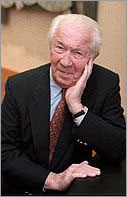And to get his point across to all sides, he uses an Original Sin metaphor.
New Scientist writer Clint Witchalls interviewed de Duve about his new book with Neil Patterson, Genetics of Original Sin: The Impact of Natural Selection on the Future of Humanity.
Some of it is a little touchy-feely, lamenting exhaustion of natural resources without realizing that natural resource demands have changed over time. We won't need oil forever, nor coal, and their depletion will not kill mankind just like lack of them did not kill mankind. But the events that may be second-order effects of resource depletion (global warming being today's culprit, acid rain in the 1980s, global cooling in the 1970s and runaway population in the 1960s) are caused by group selfishness in our genes, he says, and "You need wisdom to sacrifice something that is immediately useful or advantageous for the sake of something that will be important in the future. Natural selection doesn't do that; it looks only at what is happening today. It doesn't care about your grandchildren or grandchildren's grandchildren."

Christian de Duve
Our genome determines tribal and group cohesion, he says, along with irrational competition with and hostility toward other groups and their attributes. Those parts of the genome were once essential but now can make us dysfunctional, he says.
Indeed, and that is how he invokes Original Sin. He speculates (in secular fashion - as he says, "I am not acting as an exegete") that ancient man recognized group selfishness and that was the model for Original Sin in The Bible's Book of Genesis. Now we must act against our impulses - against natural selection - to forestall our going the way of the dinosaurs. The proposed solution he prefers is population control.
you have to limit the number of inhabitants. Hunters do it by killing off the old or sick animals in a herd, but I don't think that's a very ethical way of limiting the population. So what remains? Birth control. We have access to practical, ethical and scientifically established methods of birth control. So I think that is the most ethical way to reduce our population.Do progressives want to live in a world of mandatory birth control? Perhaps, given their modern love affair with big government, but I doubt it. I suppose conservatives don't either - heck, conservatives are against voluntary abortion even knowing the baby may grow up to be a gay socialist so I am sure they don't want a mandatory birth restriction.
He isn't all that optimistic but says he is in the interview. He writes in the book, "our most decisive traits are epigenetic, the product of culture and education; our brains rewire as we mature and give us the ability to supersede the genetic imperative to reproduce at all cost. The necessary cultural shift, however, prioritizing protecting the environment over our own immediate desires, will require the simultaneous education of parents and children and thus, will be extremely difficult to accomplish."
Being honest, if you have Europeans (I include the bulk of Americans in that due to heritage) limiting birth and the rest of the world not, you are just going to have a world without Europeans and Americans - that is how natural selection works. When a few of us deny our genetic interests for the group, others in the group will further their own genes. Altruistic people would be genetic losers.
So science will need to find a more optimistic solution to our resource issues, just like science always has in the past. The government solution will be forced sterilization, which is not cultural progress.
Being a retired biologist with a Nobel prize who no longer has to give a hoot what anyone thinks, he also says things as a biologist that more militant women will not like - "I think women are less aggressive than men, and they play a larger role in the early education of the young and helping them overcome their genetic heirloom" - while contending they should be given more power, which I assume most women would like, unless they are altruistically suppressing their genetic desires.





Comments